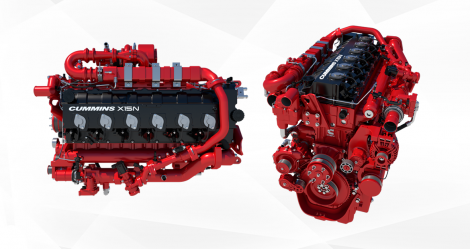Cummins Advances Natural Gas, Hydrogen Engines
‘A Path Forward’
- Cummins Inc.’s N15 engine, which will be introduced in the United States in 2024, is pictured.
- Cummins’ hydrogen fuel cell demonstration vehicle, picture here, was unveiled at the 2019 North American Commercial Vehicle Show in Atlanta, Georgia.

Cummins Inc.’s N15 engine, which will be introduced in the United States in 2024, is pictured.
Cummins Inc.’s 15-liter natural gas engine is coming to the United States by 2024.
The engine was introduced in China earlier this year and can be paired with a Cummins Eaton Automated Transmission Technologies Endurant HD Transmission and Cummins Fuel Delivery System, ensuring a purpose-built and fully integrated natural gas powertrain. The 15-liter engine will offer ratings up to 500 horsepower and 1,850 foot pounds of torque and is expected to weigh 500 pounds less than comparable 15-liter diesel engines currently available on the market while not requiring Selective Catalytic Reduction (SCR) to meet 2024 California or Environmental Protection Agency emission standards.
“As I’ve talked to end customers, they are very excited about this product and in particular, as they pursue their own goals for carbon reduction,” said Jennifer Rumsey, Cummins president and CEO. “In the coming years, they see natural gas as a great way to meet those, including using renewable natural gas. So we expect some upside opportunities as we bring that new platform into the market and also some growing interest to natural gas in the market.”
The 15-liter natural gas engine is part of Cummins strategy for its path to zero emissions. It can run on either natural gas or hydrogen, something Cummins officials said makes it a versatile offering to heavy-duty truck makers depending on their chosen environmentally friendly engine.
“The 15-liter natural gas engine is an important part of our path to zero emission strategy, by offering a significant reduction in both criteria pollutants and greenhouse gases in a product that’s available today and utilizes existing infrastructure,” said Tom Linebarger, Cummins chairman and CEO, during a recent conference call with investor analysts.

Cummins’ hydrogen fuel cell demonstration vehicle, picture here, was unveiled at the 2019 North American Commercial Vehicle Show in Atlanta, Georgia.
“Equally exciting is that this engine is designed to accept a range of gases and renewable fuels, including hydrogen in the future. In fact, all of Cummins’ engine platforms are being designed with the same fuel flexibility. At the same time, we are working with Chevron and others in the energy industry to increase the availability of renewable natural gas and other renewable fuels to ensure infrastructure is in place to meet our customers needs.”
One analyst question focused on Cummins’ dual-track development of electric fuel cells and hydrogen engines given Cummins’ ability to convert a 15-liter internal combustion engine to burn hydrogen. Linebarger said the investment in both hydrogen and electric engines allows Cummins to be flexible in what it offers to potential customers.
Hydrogen can be a short-term answer for some customers who may switch to fuel cells later as the technology evolves.
“If you have a relatively short range or you have a vocational truck, our view is maybe a hydrogen engine might work for you, especially if the conversion to fuel cell is too expensive and you’re not having that many units,” Linebarger said. “So our view is there’s a place for both, but if you want to think what’s going to really drive the transportation economy 20 years — 15 years — from now, you’re going to need the efficiency that a fuel cell, especially with an electric system, is going to provide. So our feeling still is fuel cells win, for the majority of the trucking industry, but hydrogen engines are a real addition to the portfolio of products that can be available across our markets.”
In that vein, Cummins has signed a letter of intent to acquire 50% equity in Momentum Fuel Technologies from Rush Enterprises. The joint venture will produce Cummins-branded natural gas fuel delivery systems for the commercial vehicle market in North America. Momentum Fuels Technologies’ specializes in compressed natural gas fuel delivery systems.
“And there’s a time factor too, as you can imagine,” Rumsey said. “As fuel cells advanced and costs come down, and maybe there are period of time where hydrogen engines are having an economic advantage, but as Tom said over time costs come down, that efficiency benefit for customers that are really driven strictly by total costs on ownership we think will drive a shift toward fuel cell and applications like Line Haul.”
In other new technology developments, Cummins is launching a set of software features to integrate its powertrains with Automated Driving System (ADS) technologies. Cummins is actively testing more than 100 vehicles in coordination with automated driving systems.






